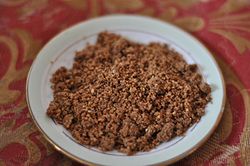Duqqa
 | |
| Type | Dip |
|---|---|
| Course | Side dish or hors d'œuvre |
| Place of origin | Egypt |
| Region or state | Egypt and Middle East |
| Main ingredients | Herbs, nuts (usually hazelnut), spices |
Duqqa,[spelling 1] du'ah, do'a,[1] or dukkah (Egyptian Arabic: دقة Egyptian Arabic pronunciation: [ˈdoʔʔæ], Hejazi Arabic pronunciation: [dʊgga]) is an Egyptian and Middle Eastern condiment consisting of a mixture of herbs, nuts (usually hazelnut), and spices. It is typically used as a dip with bread[2] or fresh vegetables for an hors d'œuvre.[3] Pre-made versions of duqqa can be bought in the spice markets of Cairo, where they are sold in paper cones, with the simplest version being crushed mint, salt, and pepper.[4] The packaged variety that is found in markets is composed of parched wheat flour mixed with cumin and caraway.[5] In the Hejaz region, it has been part of the regional cuisine for decades.
Etymology
[edit]The word is derived from the Arabic for "to pound"[6][7] since the mixture of spices and nuts is pounded together after being dry roasted to a texture that is neither powdered nor paste-like.
Ingredients
[edit]The actual composition of the spice mix can vary from family to family,[8] vendor to vendor though there are common ingredients, such as sesame, coriander, cumin, salt and black pepper. Reference to a 19th-century text[9] lists marjoram, mint, zaatar and chickpeas as further ingredients that can be used in the mixture. A report from 1978[10][11] indicates that even further ingredients can be used, such as nigella, millet flour and dried cheese. Some modern variants include pine nuts,[12] pumpkin seeds[13] or sunflower seeds.[14]
Internationally
[edit]In the 2000s, duqqa began to become popular in some countries outside Egypt. In the United States it gained exposure through such TV shows as Top Chef, Chopped and Iron Chef America. In Australia, several companies began to make it in a variety of flavours, where its popularity may have been due to Lebanese and Arabic immigration as well as television cooking shows such as SBS Food Network. It can be found in supermarkets, specialty stores and many farmers' markets.
See also
[edit]Notes
[edit]- ^ Also spelled: dakka, dukkah, dukka
References
[edit]- ^ Roden, Claudia (2008). The New Book of Middle Eastern Food. Knopf Doubleday Publishing Group. p. 55. ISBN 9780307558565. Retrieved 2 July 2016.
- ^ Sortun, Ana (2013). Spice: Flavors of the Eastern Mediterranean. Harper Collins. p. 6. ISBN 9780062336514. Retrieved 2 July 2016.
- ^ Malouf, Greg and Lucy Malouf (1999). Artichoke to Za'atar: Modern Middle Eastern Food. University of California Press. p. 278. ISBN 9780520254138. Retrieved 2 July 2016.
- ^ Davidson, Alan (1999). The Oxford Companion to Food (2014 ed.). Oxford: Oxford University Press. p. 269. ISBN 9780191040726. Retrieved 2 July 2016.
- ^ Davidson, Alan (1999). The Oxford Companion to Food (2014 ed.). Oxford: Oxford University Press. p. 269. ISBN 9780191040726. Retrieved 2 July 2016.
- ^ Green, Aliza (2015). The Magic of Spice Blends: A Guide to the Art, Science, and Lore of Combining Flavors. Quarry Books. p. 34. ISBN 9781631590740. Retrieved 2 July 2016.
- ^ Marks, Gil (2010). Encyclopedia of Jewish Food. Houghton Mifflin Harcourt. pp. 672 pages. ISBN 9780544186316. Retrieved 3 July 2016.
- ^ Roden, Claudia (2008). The New Book of Middle Eastern Food. Knopf Doubleday Publishing Group. p. 55. ISBN 9780307558565. Retrieved 2 July 2016.
- ^ Lane, Edward William (1908). The manners & customs of the modern Egyptians. London; New York: J.M. Dent & Co.; E.P. Dutton & Co. p. 137. Retrieved 2 July 2016.
- ^ Davidson, Alan (1999). The Oxford Companion to Food (2014 ed.). Oxford: Oxford University Press. p. 269. ISBN 9780191040726. Retrieved 2 July 2016.
- ^ Landry, Robert (1978). Guide culinaire des épices aromates et condiments. Verviers, Belgique: Marabout.
- ^ Zizka, Maria. "Cooking from the World Pantry: Dukkah". KCET. KCETLink Media Group. Retrieved 3 July 2016.
- ^ Shulman, Martha Rose. "Pumpkin Seed Dukkah". New York Times: Cooking. The New York Times Company. Retrieved 3 July 2016.
- ^ Ottolenghi, Yotam (3 June 2011). "Yotam Ottolenghi's butter bean purée with dukkah recipe". Guardian News and Media Limited. The Guardian. Retrieved 2 July 2016.

